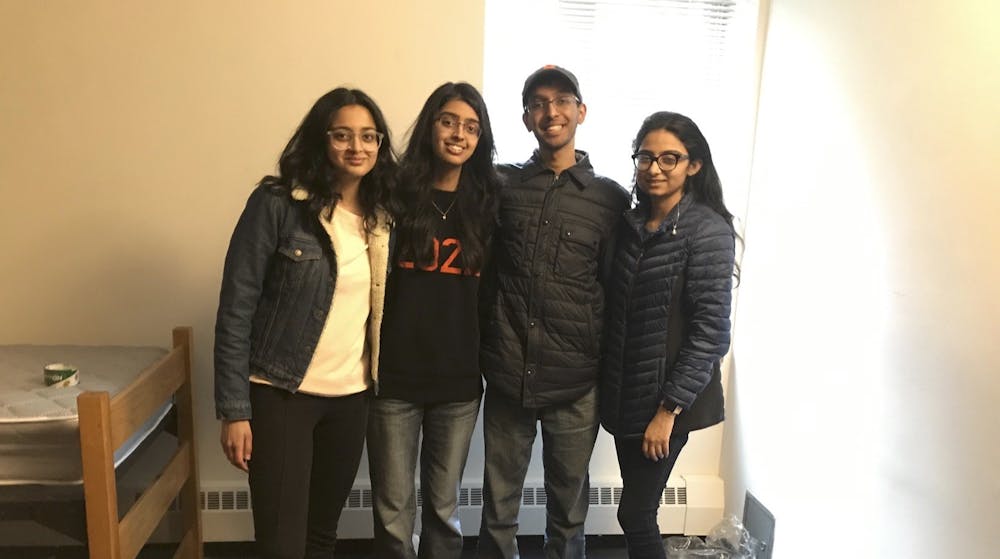Hours before President Donald Trump announced a travel ban affecting 26 European countries on Wednesday, the Indian Group of Ministers announced their own travel ban, extending to overseas citizens of the country — individuals who are ethnically Indian but citizens of foreign countries.
Manya Kapoor ’22 and Ananya Vinayak ’22 were plunged into a state of panic. They needed to find a way to return to their home country, and fast.
Kapoor didn’t sleep. She didn’t study for her chemistry exams. She scrambled instead to find a flight to India — any flight to India — before the travel ban’s enactment at 12:00 p.m. GMT on March 13.
On Wednesday night, Nassau Hall made an announcement of its own: “All students who are able to must return home and stay home for the rest of the semester.”
For most domestic students, the University’s directive meant navigating the pain of a semester cut short. For many international students, the pain was different. Forced to monitor the evolving crises both in the United States and abroad, they continue to grapple with unanswered questions, most pressingly whether they can and should stay on campus.
“In some ways, they heard our voices,” Bharat Govil ’22 said of the directive. “They didn’t kick everybody out.”
Following a petition against forced departure from campus that garnered over 3,500 signatories, the University granted leniency to students from countries with CDC level 2 or 3 warnings, allowing them to petition to stay on campus for the remainder of the term. A major rise in CDC levels on Thursday morning greatly increased the number of affected students; as of March 12, every European country had been elevated to CDC level 3, the highest warning level for the coronavirus infection.
Ben Clarke ’20 is one student affected by the University’s warning level policy. Clarke is from Northern Ireland — where 20 cases of coronavirus have given the country a CDC level 3 warning — and thus eligible to remain on campus.
Clarke characterizes the effect of the University’s announcement as “more permanent” for international students than it is for domestic ones.
Domestic students may be leaving campus, he said, “but after graduation, they’ll work and live in the same cities. I’ll be in the U.K. I haven’t cried yet. Many of my American friends have already cried.”
He spent Thursday afternoon with his club soccer team, Wawa United, a group that he’d spent the last two years building “from the ground up.” In an emotionally charged moment, Clarke huddled around his American teammates and shared parting words to his team members.
A concern even more pressing for some international students than the travel logistics of returning home is whether they feasibly can. A variety of regional concerns, like local internet connection and health care infrastructure, on top of the financial burden of international flights, complicate their decisions.

“There’s no way I’m returning back to Brazil,” said Elie Svoll ’22, who lacks health insurance in his home country. “All of my friends — and everything I have — is here.”
Simeel Angdembe ’23 decided not to return home to Nepal because of the economic burden. “I cannot afford to fly back,” says Angdembe. At the moment, the University is offering sponsorships of $150 for travel costs. Put simply by Angdembe: “That is not enough.”
Brian Gitahi ’23, from Kenya, also pointed out the disruptions to academic work for many international students.
“Returning home costs money, then there are internet problems, and we have to take classes at 3 a.m.,” he said.
Direct flights to many international countries are also becoming harder to find, particularly in Asia, the epicenter of the coronavirus.
Eager to return home to Singapore, Rachel Qing ’23 found that all direct flights to the country before next Friday were fully booked. “I finally booked a flight to Singapore for a week from today,” she said.
Despite 12 new cases of coronavirus announced by Singapore on Wednesday, Qing is insistent on returning home. “Singapore is like China,” Qing said, “where we think the crisis has already peaked out and things are getting better.”
This differs from the U.S. federal government’s reaction to managing this pandemic, which has been characterized as slow and unprepared. In New York state, cases have quadrupled last week, causing officials to plead for more test kits from the Centers for Disease Control and Prevention.
“I [would] definitely feel safer if I caught this in Korea,” Jean Cho ’20 said, noting that health care is more accessible in her home country of South Korea with diagnostic tools and coronavirus testing available at local clinics.
Despite this, Cho plans to remain on campus because of visa concerns and her senior thesis on the effects of social isolation on bumblebees, which requires lab work on campus.
Applications in particular for Optional Practical Training (OPT) visas, necessary for working in the United States, have been a major concern for seniors, as approval requires remaining in the country.
Cho, who is applying for a work visa for prospective employment in New York, said “We don’t know if we’ll be able to enter the country again. It’s difficult for us to just leave.”
“As international students, we will need to support each other and work to lift each other’s spirits,” said Sultan Al Habsi ’22, an international orientation leader from Oman. Al Habsi, who is remaining on campus, acknowledged ongoing uncertainties regarding food availability and isolation on campus.
Cho is also a former international orientation leader. On the verge of tears, she shared that many of her “frosh,” struggling with the logistics and burdens of returning home and hoping to remain on campus, have reached out to her over the past week.
“It’ll be our chance to help the freshmen one last time,” she said.








